Chevrolet Trax: Transmission replacement
Removal Procedure
- Remove the battery tray. Refer to Battery Tray Replacement .
- Remove the front bumper fascia opening upper cover. Refer to Front Bumper Fascia Opening Upper Cover Replacement .
- Without draining the coolant or removing the hoses, remove and position
aside the radiator surge tank.
Refer to Radiator Surge Tank Replacement (LUV, 2H0, LUJ) .
- Remove the transmission range selector lever cable. Refer to Range Selector Lever Cable Replacement.
- Remove the power brake booster pump assembly, if equipped. Refer to Power Brake Booster Pump Replacement .
.gif)
Fig. 66: Identifying Control Valve Body Transmission Control Module (TCM)
Electrical Connector
- Disconnect the control valve body transmission control module electrical connector (1) then unclip the connector from the transmission.
- Remove the transmission fluid cooler inlet hose from the transmission. Refer to Transmission Fluid Cooler Inlet Pipe Replacement .
- Remove the transmission fluid cooler outlet hose from the transmission. Refer to Transmission Fluid Cooler Outlet Pipe Replacement .
- Plug and/or cap the pipes and transmission to prevent contamination.
.gif)
Fig. 67: Upper Transmission To Engine Bolts
- Remove the upper transmission to engine bolts (2).
- Install the support fixture.
.gif)
Fig. 68: Identifying Fluid Level Hole Plug
- Drain the transmission fluid. Refer to Transmission Fluid Drain and Fill.
- Remove the exhaust front pipe. Refer to Exhaust Front Pipe Replacement (LUV) , Exhaust Front Pipe Replacement .
- Remove the drivetrain and front suspension frame. Refer to Drivetrain and Front Suspension Frame Replacement (Long Cradle) , Drivetrain and Front Suspension Frame Replacement (Short Cradle) .
- Remove the front wheel drive shafts from the transmission. Refer to Front Wheel Drive Shaft Replacement - Left Side , and Front Wheel Drive Shaft Replacement - Right Side .
- On FWD vehicles, remove the intermediate shaft. Refer to Front Wheel Drive Intermediate Shaft Replacement (LUV with MH8 or MH5) .
- On AWD vehicles, remove the transfer case. Refer to Transfer Case Replacement .
- Remove the rear transmission mount bracket from the transmission. Refer to Transmission Mount Bracket Replacement - Rear (AWD), Transmission Mount Bracket Replacement - Rear (FWD).
- Remove the starter motor. Refer to Starter Replacement (LUV) , Starter Replacement (2H0) .
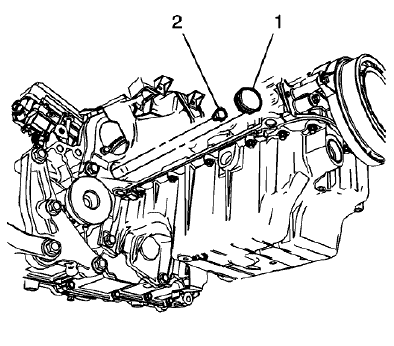
Fig. 69: Flywheel Bolts And Hole Cover
- Mark the relationship of the flywheel to the torque converter for reassembly.
- Remove the hole cover (1) and the three torque converter to flywheel fasteners (2).
.gif)
Fig. 70: Left Transmission Mount
- Remove the left transmission mount (6). Refer to Transmission Mount Replacement - Left Side.
- Use a transmission jack in order to support the transmission.
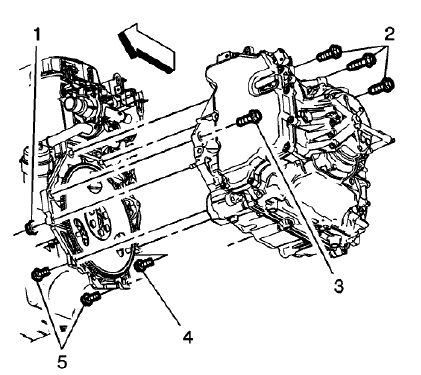
Fig. 71: Upper Transmission To Engine Bolts
- Remove the lower transmission fasteners (1, 3, 4, 5).
NOTE: Ensure the torque converter remains securely in place on the transmission input shaft while separating and removing the transmission.
- Separate the transmission from the engine.
- Lower the transmission with the transmission jack far enough to remove the transmission.
- Flush and flow test the transmission oil cooler and lines. Refer to Transmission Fluid Cooler Flushing and Flow Test .
Installation Procedure
- Raise the transmission with the transmission jack and position the transmission to the engine.
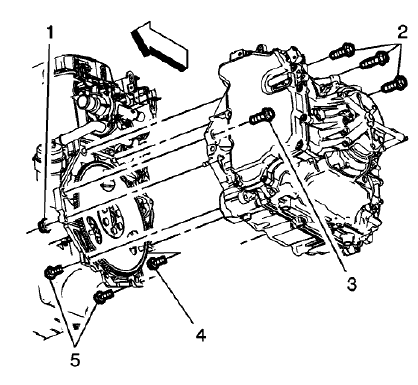
Fig. 72: Upper Transmission To Engine Bolts
CAUTION: Refer to Fastener Caution .
- Install the transmission bolts (3, 4) and tighten to 60 (44 lb ft).
- Install the transmission bolts (5) and the transmission nut (1) and tighten to 40 (30 lb ft).
- Remove the transmission jack.
.gif)
Fig. 73: Left Transmission Mount
- Install the left transmission mount (6). Refer to Transmission Mount Replacement - Left Side.
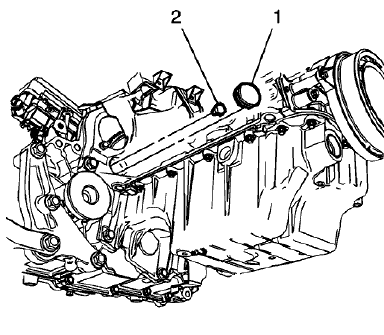
Fig. 74: Flywheel Bolts And Hole Cover
NOTE: If reusing the torque converter bolts, clean the threads and apply threadlocker to the threads prior to installation.
- Install the torque converter to flywheel bolts (2) and tighten to 60 (44 lb ft) and install the hole cover (1).
- Install the starter motor. Refer to Starter Replacement (LUV) , Starter Replacement (2H0) .
- Install the rear transmission mount bracket to the transmission. Refer to Transmission Mount Bracket Replacement - Rear (AWD), Transmission Mount Bracket Replacement - Rear (FWD).
- On AWD vehicles, install the transfer case. Refer to Transfer Case Replacement .
- On FWD vehicles, install the intermediate shaft. Refer to Front Wheel Drive Intermediate Shaft Replacement (LUV with MH8 or MH5) .
- Install the front wheel drive shafts to the transmission. Refer to Front Wheel Drive Shaft Replacement - Left Side , and Front Wheel Drive Shaft Replacement - Right Side .
- Install the drivetrain and front suspension frame. Refer to Drivetrain and Front Suspension Frame Replacement (Long Cradle) , Drivetrain and Front Suspension Frame Replacement (Short Cradle) .
- Install the exhaust front pipe. Refer to Exhaust Front Pipe Replacement (LUV) , Exhaust Front Pipe Replacement .
- Remove the support fixture.
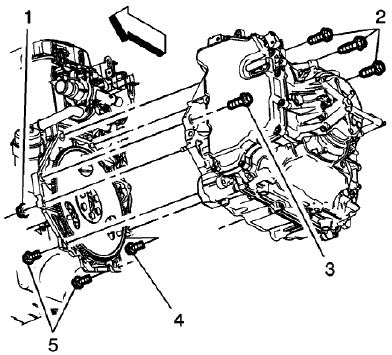
Fig. 75: Upper Transmission To Engine Bolts
- Install the upper transmission to engine bolts (2) and tighten to 60 (44 lb ft).
.gif)
Fig. 76: Identifying Control Valve Body Transmission Control Module (TCM)
Electrical Connector
- Connect the control valve body transmission control module electrical connector (1) then clip the connector to the transmission.
- Install the transmission fluid cooler outlet hose to the transmission. Refer to Transmission Fluid Cooler Outlet Pipe Replacement .
- Install the transmission fluid cooler inlet hose to the transmission. Refer to Transmission Fluid Cooler Inlet Pipe Replacement .
- Install the power brake booster pump assembly, if equipped. Refer to Power Brake Booster Pump Replacement .
- Install the transmission range selector lever cable. Refer to Range Selector Lever Cable Replacement.
- Adjust the automatic transmission range selector lever cable. Refer to Range Selector Lever Cable Adjustment.
- Install the radiator surge tank. Refer to Radiator Surge Tank Replacement (LUV, 2H0, LUJ) .
- Install the front bumper fascia opening upper cover. Refer to Front Bumper Fascia Opening Upper Cover Replacement .
- Install the battery tray. Refer to Battery Tray Replacement .
- Fill the transmission with fluid. Refer to Transmission Fluid Drain and Fill.
- If a NEW transmission control module (TCM) has been installed into the vehicle, the NEW module needs to be reprogrammed.
NOTE:
The transmission adaptive values learn procedure must be performed when one of the following repairs have been made to the vehicle. Failure to perform the procedure after one of the following repairs may result in poor transmission performance, as well as transmission DTCs being set:
- Transmission internal service/overhaul
- Valve body repair or replacement
- Control solenoid valve assembly replacement
- TCM software/calibration update
- Any service in response to a shift quality concern
- Perform the transmission adaptive values learn. Refer to Transmission Adaptive Values Learn .
- Road test the vehicle.

